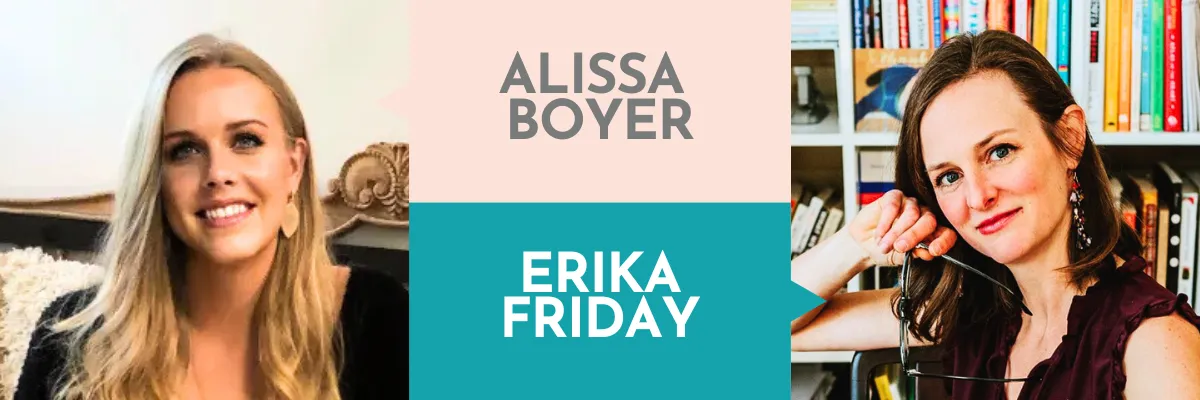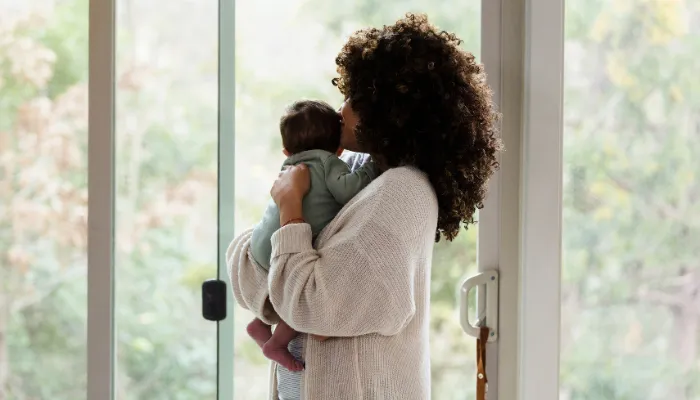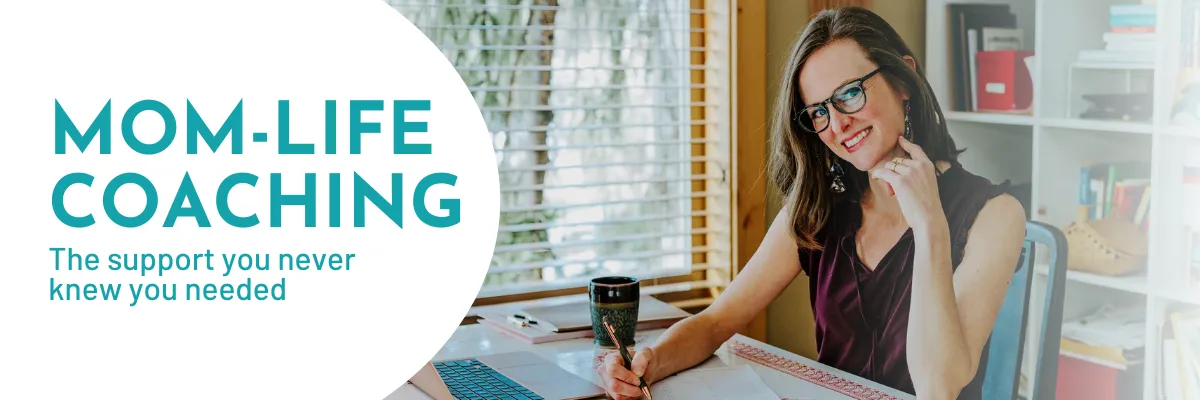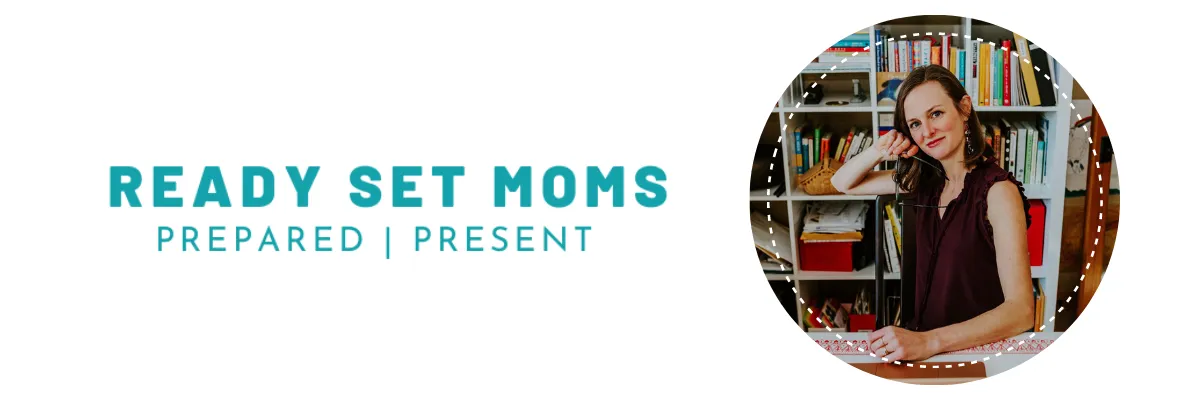Helping The Highly Sensitive Mom

The Highly Sensitive Mom
Is anyone ever ready for what it’s going to feel like to be a mom?
In this conversation, Erika Friday, mom-life coach, and Alissa Boyer, mentor to highly sensitive people explore the intersection of motherhood and HSP and the unique challenges that that combination can present. How comparison, expectations, overstimulation, overwhelm, and perfectionism are especially tricky for HSPs in motherhood. It’s an honest look into what it felt like for the two of us, shared in the hope that it can help you, too.
Before we dive in, here’s what it means to be a highly sensitive mother or person, according to VeryWellMind.com.
- Highly sensitive parents or people may avoid external stimuli like “noisy crowds, bright lights, or uncomfortable clothing.” Loud noises are often too much to bear and cause sensory overload. Limiting sensory input is vital for an HSP.
- Highly sensitive people may feel a need for downtime, “especially when you have hectic days; needing to retreat to a dark, quiet room”. Alone time is key for their emotional well-being and they benefit greatly from setting clear boundaries. Quiet time can do wonders for someone who is very affected by sensory overstimulation.
- An HSP mother may be “deeply moved by beauty, either expressed in art, nature, or the human spirit, or sometimes even a good commercial”. A deep appreciation for all sorts of things is a signifier of someone who is highly sensitive.
- Another HSP trait: Sensitive moms may have “a rich and complex inner life, complete with deep thoughts and strong feelings that go with them”. They’re often quite empathetic due to their depth of processing and relate very strongly to the emotions of others.
Now, let’s dive in even more!
What does it mean to be a highly sensitive person (HSP) or highly sensitive mom?
ERIKA: Alissa, could you tell us for people who don't know what HSP even is?
ALISSA: So HSP stands for a highly sensitive person, and being a highly sensitive person is a trait, something you're born with. It's not something you need to be diagnosed with, it's not a disorder. I always compare it to being an introvert or an extrovert. Some of us are just wired to be more highly sensitive.
And the scientific term for highly sensitive person is sensory processing sensitivity. Highly sensitive people are more impacted by their environments. So HSPs are often the people who will feel that the lights are too bright, or they notice a smell that others don't know. They might feel more impacted by an itchy tag, Oh, this fabric is bothering me. Very much noticing these different sensory stimulants in their environments.
We also, HSPs also process more deeply. So I'll always say, it kind of can feel like you're missing a barrier between yourself and the rest of the world, like you're absorbing more, you're noticing more, you're noticing shifts in people's facial expressions and like you can sometimes feel very sensitive to other people's energy and be the person that knows, Oh something's off with them, something's bothering them.
Also highly sensitive people have an abundance of empathy, they've done brain scans on HSPs and they've found that there are more active mirror neurons in our brains, which are responsible for us being able to relate to, understand, and feel somebody else's experience.
So definitely that empathetic person, that friend people often go to and for advice because people can often sense that warm, genuine caring energy from us.
And highly sensitive people just have this depth. A lot of times we are interested in spiritual topics, we want to know the meaning of things. We tend to be more emotional, and cry more easily because again we're so connected to the world around us, both in a sensory sense but als on an emotional level. We're feeling a lot.
How to tell if you are a highly sensitive person
Dr. Elaine Aron, the originator of the term highly sensitive person, created a test to let you assess for yourself if you have this trait. If you think you may be a highly sensitive mom, you can also find tests regarding sensation seeking and your child’s sensitivity.
I found the self-test to be illuminating, and her book The Highly Sensitive Parent by psychologist Dr. Elaine Aron unlocked a world of self-compassion for me. HSP parents are absolutely a thing, which you can learn more about in the aforementioned book by Dr. Aron.
Sensory sensitivity and overstimulation

ERIKA: I love that you just taught me the term sensory processing sensitivity rather than sensory processing disorder, which kind of normalizes the sensitivity as within the realm of experience that doesn't need to be treated. It just needs to be understood so that you can work with it.
ALISSA: That's exactly it because one of the downfalls of being highly sensitive is that we have a tendency to be overstimulated more easily than someone who's less sensitive.
And it's just by design our nervous systems are more sensitive. So for example, if there's a lot going on at once, like music going too loud and the lights are bothering you and people are talking, you can get to that place of feeling overstimulated and agitated and again, it's not a disorder, it's just that we process and take in more so it's about mitigating that learning how to support yourself as a highly sensitive person so that you can thrive as much as possible in a variety of situations rather than shutting down and needing to avoid all the time.
High sensitivity in motherhood
ERIKA: So you and I had a different experience entering motherhood because it was only after I became a mother and my I swear my wiring changed and I became even more sensitive to all the stimulation.
But you entered motherhood already understanding yourself as an HSP. So I'm curious how your experience of being an HSP changed in motherhood, if at all.
ALISSA: It definitely changed. It did help to have that awareness about myself because I did a lot of planning ahead.
It was interesting for me because when I was pregnant, there's so much focus on the birth and the nursery and blah, blah, blah, but I always had this awareness that I wanted to focus on postpartum.
I just knew intuitively that that was really gonna impact me. I'm just gonna have a new baby and I wasn't gonna be sleeping and I just knew that and I was terrified of postpartum.
So I did what I could to plan ahead for that and that was really helpful. I had a doula that helped us with birth and then she was there with us for the first six weeks postpartum and so she two days per week to help take care of me, which was amazing as a sensitive person because it's such a shock to your system. I knew that I needed to take extra good care of myself as much as I could.
I knew that I needed to ask for help and not be shy about that because I just know my limits can be smaller and that acceptance in myself was helpful because I wasn't judging myself for it.
I just knew that's how I was, but even with that still I was shell-shocked, it was still very very intense, truly hardest experience of my life even with that preparation.
I do feel like becoming a mother intensified my sensitivity, especially because no matter what you, you just get less time to yourself at least especially in the early days, and so it was a huge adjustment for me. But absolutely knowing my sensitivity helped at least with the self-judgment piece and being like, okay, well, it makes sense. You're overwhelmed, your life is completely different now.
Quick reminder: being a highly sensitive parent doesn’t make you a bad parent. Recognizing and learning more about yourself as an HSP is a great way to become an even better parent and be able to set yourself up for success.
Self compassion in motherhood

ERIKA: You're so self-compassionate and I've always admired that about you. Does that come naturally or have you had to learn that?
ALISSA: I've had to learn that. I've had to work on it a ton because my natural tendency has been to be self-critical.
I hold myself to a really high standard and, while I wouldn't say I'm a perfectionist, I am somebody who likes to do things well and I like to succeed and achieve and all of the things. So I've had to work at it, because I know that being really hard on myself just makes everything worse.
I used to have digestive issues because I was so hard on myself, so it's one of those things — I can't go there.
It has to be a boundary I have with myself to treat myself with love in order to get through hard things.
ERIKA: So was there a way, was there a practice that helped you develop self-compassion or was it simply a decision and an awareness?
ALISSA: It was definitely work. It was internal work that I had to do to get to that place. The main thing I do when I support highly sensitive people through my work is helping them to feel more confident and to have high self-worth.
Because before this, I didn't. I was really insecure. I measured my worth and value on how well I did, how impressive I was. And so, I was super self-critical. But it came to a point where again, it was making me sick.
I remember my husband called me out on it. He's like, “You're so hard on yourself. You don't even see what you're capable of because you're constantly just judging yourself.”
And so I really had gone on this whole journey of building confidence as my goal. “I'm not going to stop until I figure this out.”
And so that was really the thing for me where eventually it kind of rewired the way I navigate life and treat myself.
Quick reminder: simple practices like being kinder to yourself and more self-compassionate can go a long way for a highly sensitive parent.
HSP + self-criticism
ERIKA: You recently wrote on Instagram that highly sensitive people often have a harsh inner critic that keeps them stuck in perfectionism and hyper, hyper achievement.
What is it about being highly sensitive that correlates with this inner critic?
ALISSA: I've noticed a lot of highly sensitive people are very self-aware and so we can be very aware of how we can improve what things aren't up to our standards, and so we can have this tendency to be hard on ourselves.
The other thing, too, is a lot of HSPs grew up hearing “you're too sensitive,” “you're too emotional,” “you're too much,” and so a lot of us then were praised when we are being quiet, when we are getting good grades, when we are doing the right things.
And so we start to correlate, “oh, I'm good and valuable when I do this. When I am overgiving, when I'm working really hard and impressing people.”
And so that starts to become our identity. And so, any time we don't do that well enough, it then shakes our identity in the way we feel about ourselves.
And it threatens at a deep level this feeling of, “oh my gosh, I'm going to be abandoned. I'm not going to be accepted. People aren't going to like me.” And we're just extra hard on ourselves. So I would say that's a huge, huge component of it.
ERIKA: That makes a lot of sense. And it kind of breaks my heart too, truly.
How to stop confusing overstimulation & overwhelm

ERIKA: Something I would love to dive into because of your specialty mentoring highly sensitive people is that dual concept of overstimulation and overwhelm.
Because I feel like sometimes people confuse those two. One can lead me to the other. If you're feeling one, it kind of makes you more susceptible to being overcome by either overwhelm or overstimulation.
So I'd love to just wrap about that a bit. How do you define those two terms, overwhelm and over stimulation? How do you see them relating?
ALISSA: With overstimulation, I would say it's like you're experiencing more than your nervous system is able to handle.
It's like you're in the state of dysregulation and it's caused by these external factors, all of these things going on, which can then lead to this feeling of overwhelm, which is like, “this is too much for me, I can't handle it.” But the overstimulation is at the root of it.
And so I think a lot of times we will just default to, “I'm overwhelmed, this is too much for me!” But we're not actually looking at the factors around us that can be contributing to that.
So we're trying to fix other things and trying to control where we can, but not recognizing, oh, well, maybe I just need to tidy up my kitchen a little bit, or maybe I need to just change my clothes because I'm uncomfortable. It's wild how many times I've felt overwhelmed and on edge and then I make a simple shift and I reduce the overstimulation in my environment and it immediately calms me.
So [we need to cultivate] that awareness of what could be causing that feeling of overwhelm.
I think the other piece of it too is, with overwhelm specifically, a lot of times we are focusing on what we are capable of versus what we have capacity for.
So we'll have this long to-do list because we think, well, “I'm a capable person. I can do all of the things”, but we're not checking in with our actual capacity and what we have energy and mental space for that day.
So a lot of times that, too, can lead to overwhelm because we're just piling all the things on and not taking ourselves into the equation.
ERIKA: That's a beautiful distinction and kind of right-sizing your goals to your capacity, whether it's today or this season while I have a baby or whatever it is.
Do you have tips that you follow for yourself or that you coach people on to help keep overstimulation at bay or to endure it or to recover from it?
ALISSA: Yeah, so to me, having regular ways that you check in with yourself is really important because a lot of times you can get really wrapped up in how you're feeling and not even have awareness as to why you're feeling anxious or on edge.
So just making it a regular practice to kind of check in with yourself and ask, how am I feeling? What do I need in this moment?
Even yesterday, I noticed myself feeling anxious. It was like 4: 30, it's that time of the day where I’ve gotta make dinner, and the kid needs to be busy, and it's a lot. But I was like, okay, well, the kitchen was messy, the living room needed tidying up. And so it's just checking in with myself and having that awareness of what works for me really helps.
And that's something I support my clients with as well, with just checking in. The other piece of it too is knowing how to expand your tolerance for discomfort and imperfect situations. That's a huge part because my goal for HSPs is to be able to thrive in a variety of situations so it's okay. What things can you arm yourself with so that when things are overstimulating or there's a lot going on that's out of your control how can you thrive or at least not feel as if you're shutting down in those situations.
So practical things like having noise-reducing earplugs can be really helpful for people who are sensitive to noise if you're going to a loud restaurant. Or making sure you do a grounding meditation before you go out with people, making sure if you go somewhere you maybe have a set time that you're going to leave.
So you know that, okay even if I'm in this situation and it feels like a lot, I have an exit plan. I've supported myself beforehand, doing the extra things that you can do. I always talk about putting on your armor for the day if possible. It's not always possible, especially as a mom. But if possible, carving out some time for yourself in the morning to just a self-regulating check-in. Have some reflection before you go into the chaos of the day.
Overstimulation: Avoiding it, minimizing it, recovering from it, or tolerating it
ERIKA: It's an interesting paradox where understanding yourself as an HSP and your propensity to being overstimulated or overwhelmed. I feel like the work I've been doing lately is how to accommodate myself, how to avoid such situations, minimize them or recover from them, which are all important and valid.
But you offered another suggestion, which is that the world we live in can be a lot, so how can we increase our tolerance for it?
I think with any kind of advice, I am highly suggestible. I can hear something and then take it maybe a little too far.
But what's interesting here is you have all of these options. We're not suggesting that you be hard on yourself, that you should be able to tolerate things, but we're saying, you CAN. You CAN get through these things and we can teach you how to recover from them after.
ALISSA: Exactly, and that's really important to me and that's where, and I know there's some people that resonate with my approach a lot of people do and then there's some that are like, no, I don't wanna do these things and that's totally fine.
And for me, I'm a person who likes to travel. I like to have new experiences. I'm married to an extrovert non-HSP, which means I have to compromise. Sometimes he wants to go out, I don't want to, but we have to compromise. And so having those tools in my toolkit has enriched my life because I get to do things.
And a lot of times my sensitivity, my introverted nature will say, “I don't want to do that. This is going to be too much for me.” And then actually a lot of times it ends up being great.
So teaching people to be more flexible at times but also knowing your limits and knowing when it's “no, this is a no, I have to stay home,” but having the option versus feeling like your only option is to avoid situations. That’s really important to me because I don't want HSPs to feel like they can't do cool things in the world just because they're highly sensitive.
ERIKA: A beautiful thing that I heard in what you just said is the way you talk to yourself, I bet is the same way you talk to your child.
ALISSA: Yeah, I tried to have that be the goal, for sure. Respectful and encouraging at the same time.
ERIKA: Yeah, it's really beautiful.
ALISSA: Thank you.
Quick reminder: setting healthy boundaries as an HSP mom can be very beneficial, but so can being flexible.
The privilege of single-tasking
ERIKA: I read another thing that you put out there about single-tasking, and I've been thinking about this lately, and single-tasking almost feels like a vacation, when you have the luxury of having your mind and your body doing only one thing.
As a mom, that can be really hard to come by for a couple of reasons. One, small people are demanding and unpredictable.
And two, that capacity thing. Whereas we used to be able to either single task or manage our thoughts and our requirements, now there's just so much more demanded of us, and I think we have a hard time adjusting.
So I think my question is, are you as a mom able to single task, and how do you do it?
ALISSA: Not nearly as much, because I wrote that before I was a mom and that definitely changed. But I do, as often as possible, I do try to apply this to when I'm working because it does help me to be more effective and productive, which I always thought, Oh, I'll be more productive if I'm doing this, and this, and this, but I learned that hopping around and shifting my focus so much was actually counterproductive and I wasn't doing as much.
And so it helps when working. But I do try to apply this when I'm with my daughter, and there's that impulse to do other things when I'm with her, and I will clean up or whatever, but I also find that the times when I get the most overstimulated or irritated It's when I'm trying to do things and I feel like she's getting in the way. But when I can have that present single focus of just being with her and being like, “Whatever, other things are just gonna fall to the wayside,” I'm happier.
So I have found ways to apply it, but it's not as easy as a mom, and you just have to make peace with that.
Doing motherhood your way as an HSP

ERIKA: You said when you were pregnant and expecting, you took care of “future you,” and what her needs were going to be.
Now that you are a mom, what are the things that you do because they're right for you, not because they're expected or because you're comparing yourself to other people and how they do it. There are probably things that you do and there are probably things that you choose not to do. And I'm curious if you could talk about those.
ALISSA: For me, yeah, comparing myself was a huge thing. I was part of mom groups which was amazing for me. But I was one of those people where I got a child that didn't sleep and she was very finicky with sleep. I just wasn't blessed in that department. So that was always a challenge. And there's so much noise out there about how you should do things.
“You should do it like that.” “You should do it like this.”
And then I'm in these mom groups and they're like, “My kid sleeps 12 hours.” And I'm like, cool. I was up three times.
So it was for me just trusting my intuition and being attuned to her and what felt right to me and to our relationship and really intentionally tuning out the noise.
That was really huge for me, and making it a point to not compare myself because the noise is loud. When when I first became a mom, obviously you don't know what you're doing, so you listen to everyone else because you are floundering and not sure what to do. And I noticed that I felt really anxious when I did that.
And so I had to kind of recognize, ooh, this doesn't feel good, so I'm just gonna cut it out and choose to do things my own way and figure it out. And we did figure it out, and we're here, and it's okay.
But yeah, so to me, it was just not comparing myself and really just tuning in. And then I think that's one of the superpowers we have to say, just peace, as we have a strong intuition, but a lot of times we can be susceptible to everyone else's voices and opinions.
ERIKA: Nice. Nicely done. You're so wise.
Adjusting expectations: The reality of balancing motherhood and ambition
ERIKA: Did you have expectations of what motherhood would feel like and then how was your experience compared to those expectations?
ALISSA: Oh, yeah. I felt like, Oh, when she takes naps in her crib, I'm just going to do this work. I'm going to do my work. It's going to be so easy to balance both. It'll be fine. And that wasn't the case, because kids are unpredictable, especially in those early six months or so.
I had to learn very quickly how to manage my expectations and not go into my days thinking oh, this is how it's going to look.
I had to just learn to go with the flow, which thankfully I am kind of that person anyway. I'm not super rigid about things, but I still like things to go a certain way.
I still want to do what I want to do. And so I thought that I would be able to seamlessly manage business ownership and motherhood.
And that wasn't the case. And there was definitely a grieving period because that was really hard for me, and it was sad because I felt for a while that I had to lose that ambitious side of myself just to be a mom.
So that was the thing. It did not look at all like I thought it would.
ERIKA: I wonder if there's any first time mom for whom it looks the way they think it will.
ALISSA: I don't know, but definitely the youngest sister of seven might have that experience.
Reconnecting with yourself: building self-trust and confidence

ERIKA: Exactly. Are there any other thoughts that you would want to share with readers who feel like they've lost themselves to either comparison or expectations, overstimulation, overwhelm, or perfectionism? Any thoughts you would like to leave with that reader who is stuck in one of those places?
ALISSA: Mm-hmm. I mean, the first thing is just having awareness if you’re comparing yourself a lot and it's not feeling good, and then doing an experiment with yourself to maybe mute or unfollow or just take a break from receiving advice from others, looking at what other people are doing, taking an information, maybe even detoxing from podcasts.
That's actually something I've actively had to do a lot over the last two years of my daughter's life because I noticed myself at times feeling anxious or like I was falling short or I was doing it wrong because I was taking in too much of what other people were saying and it was impacting the way I felt about myself and so it was really empowering to just shut that out for a while, even a week or two just to see what happens and reconnect to myself, because you'll find that you have a lot of wisdom within.
But you have to give yourself the opportunity to listen to yourself and build your self-trust, and you're not going to build self-trust if you're literally always looking to everyone else for the answers or thinking they have it all figured out.
And the other piece of it too is working on yourself confidence, because if you feel
confident in yourself, you're not going to feel the need to compare yourself to everyone else or look at what they're doing because you can be content in who you are in the way that you show up.
That underlying foundation is really important.
ERIKA: Well, so thank you so much for your time. This was absolutely perfect.
ALISSA: Oh, you're so welcome. Thanks for having me.
Bonus! How to cope with stress as an HSP
According to VeryWellMind.com, it is best to...
- “Avoid stressors like slasher movies and people who sap your positive energy, make heavy demands on you, or make you feel bad about yourself.”
- No more spending time doing things or hanging around people and having social interaction that you know don’t make you feel good afterward or during. Your daily schedule should charge you up, not drain you.
- Learn to say no to busy days. Your own needs can come first. You are more likely to be the best parent you can be when you say no to the things that don’t matter. You’ll have more time and energy for the things that do. Think of it as mindful parenting!
- “Let your home be a soothing environment.” Fill your home with creative expression. Suit your home to your own needs. Do you want it clean or messy? Peaceful or loud?
What will be your first step towards living an amazing life amidst highly sensitive parenthood?
This post was all about the highly sensitive mom. If this meant something to you, you might also like:
How to let go of perfectionism in motherhood
5 Ways to Start Taking in the Good
Resentment in Motherhood and What it can Teach Us
If this post helps make your mom-life easier,
subscribe to the weekly-ish newsletter and never miss a post.




